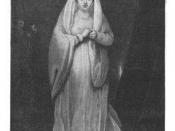Macbeth's famous soliloquy at the beginning of this act introduces an important theme: visions and hallucinations caused by guilt. The "dagger of the mind" that Macbeth sees is not "ghostly" or supernatural so much as a manifestation of the inner struggle Macbeth feels as he contemplates murdering Duncan. It "[marshals him] the way [he] was going," leading him toward the bloody deed he will do (II.i 50-54). The same can be said for the ghostly voice Macbeth thinks he hears as he kills Duncan as well as the ghostly vision of Banquo at the feast in Act 3. In fact, almost all the supernatural elements in this play could be (and often are) read as psychological rather than ghostly occurrences. If this is the case, then, one must question the role of the witches. Are they, too, products of Macbeth's fevered mind rather than real presences? The fact that they do no more that give voice to the ambitions Macbeth already harbors would seem to confirm this idea, but then there is the fact that Banquo also sees these witches and hears their prophesy in act one.
Their role continues to be ambiguous throughout the course of the play.
The "dagger of the mind" is only one of many psychological manifestations in the play. While waiting for the opportunity to kill Duncan, Macbeth finds that he is unable to pray. A psychological literary analyst would read this as a physical inability to speak caused by Macbeth's paralyzing doubt about the correctness of the murder. The inner world of the psyche invades the physical world. The same can be said for the voice that Macbeth hears saying "Macbeth shall sleep no more" (II.ii 56). Freud analyzed his patients' dreams and interpreted them in order to provide an...



Strong
It takes a big person to admits their faults and you have done so. Altough theis paper was average, it was good for your grade level. apologies on your 77
0 out of 0 people found this comment useful.